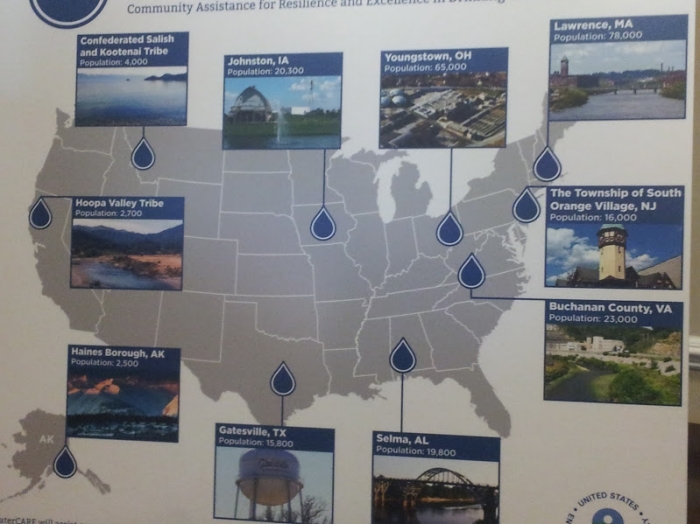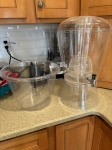South Orange Gets Water Grant
Um, wow...UNC and U of Arizona have gotten a grant to help 10 communities come up with financial strategies to solve their water infrastructure problems. And we are one of them (probably by far the most affluent one, looking at the list).
So somehow we have gotten on the list of communities that will get consulting services to help come up with water quality infrastructure project financing...even though our project is already well underway (and presumably financed?).
I guess I'm missing something. Did we apply for this because we don't have the in-house expertise, were we recommended for the program because of our unique (or broadly-applicable!) issues, or something else? Whatever the answer, I'm hoping the advice is useful!
susan1014 said:
Um, wow...UNC and U of Arizona have gotten a grant to help 10 communities come up with financial strategies to solve their water infrastructure problems. And we are one of them (probably by far the most affluent one, looking at the list).
So somehow we have gotten on the list of communities that will get consulting services to help come up with water quality infrastructure project financing...even though our project is already well underway (and presumably financed?).
I guess I'm missing something. Did we apply for this because we don't have the in-house expertise, were we recommended for the program because of our unique (or broadly-applicable!) issues, or something else? Whatever the answer, I'm hoping the advice is useful!
Thanks Susan. I'm confused. I hadn't heard about this before in anyway shape or form and I have no idea how much of a half $1 million was awarded to South Orange. Anyone have any more info?
As far as I can tell, no money is awarded to us....it is awarded to UNC and U AZ to provide advice to selected communities about how to finance/plan water related infrastructure projects. So since 10 communities are on the list, presumably we have been indirectly awarded something like $50,000 in consulting services and overhead.
I went to the EPA page about this program (which is new) and didn't find much more than the press release materials.
I thought we had our water solution, as soon as the EO contract ends and the new connection is turned on, so I'm not sure what issues we plan to attack with this support.
susan1014 said:
As far as I can tell, no money is awarded to us....it is awarded to UNC and U AZ to provide advice to selected communities about how to finance/plan water related infrastructure projects. So since 10 communities are on the list, presumably we have been indirectly awarded something like $50,000 in consulting services and overhead.
I went to the EPA page about this program (which is new) and didn't find much more than the press release materials.
I thought we had our water solution, as soon as the EO contract ends and the new connection is turned on, so I'm not sure what issues we plan to attack with this support.
Perhaps getting financing to install an activated carbon filtration system at Well no. 17, to eliminate the PFOA?
We are one of 10 municipalities selected to be members representing an EPA region. Both Walter Clarke and myself were guests of the White House to attend the EPA’s Water Infrastructure and Resiliency Finance Center 1st Anniversary Event where we were recognized as being one of the members.
Members from the UNC has had a kickoff session with us initially for understanding our finance needs and level of support. One of the tasks we requested was the review of our historical billing data and providing support on developing a rate structure.
From an E:mail from WaterCare:
Welcome to WaterCARE!
We are looking forward to working with each of you and want to start by providing additional background information on the WaterCARE program. We hope this information will provide clarity and answer questions that you may have on the process and scope of the program.
Several weeks ago, some of you were able to join us at the White House to celebrate the first anniversary of EPA’s Water Infrastructure and Resiliency Finance Center where a “soft” launching of the WaterCARE program was announced. The following week, the official kick off announcement for the project occurred in Selma, Alabama and we have been happy to hear of the press releases and events that have already taken place across the country.
We know many of you still have questions about what your community’s participation in
WaterCARE means. This letter is being sent to individuals from WaterCARE communities as well as individuals that work with communities on essential water issues. We realize we may have left a key individual off our distribution list, so please feel free to forward to anyone that you believe should be involved.
Please read on for answers to important questions.
What is WaterCARE?
In order to protect water resources and provide safe and clean drinking water and wastewater treatment, which are critical public health and environmental services, many communities must overcome the challenges and costs associated with inadequate and aging infrastructure.
WaterCARE, or Community Assistance for Resiliency and Excellence in Drinking Water and Wastewater, will assist 10 communities across the country in developing robust and resilient finance strategies for water infrastructure that meets long-term needs.
WaterCARE is an initiative of the EPA’s Water Infrastructure and Resiliency Finance Center, which acts as a resource to communities that are financing drinking water, wastewater, and stormwater infrastructure. The Center is part of the White House Build America Investment Initiative – a government-wide effort to increase infrastructure investment and promote economic growth.
The Water Infrastructure and Resiliency Finance Center has selected the Environmental Finance
Center Network (EFCN) to provide direct assistance to communities participating in the WaterCARE program. WaterCARE will be jointly managed the Environmental Finance Center at the University of North Carolina (EFC at UNC) at Chapel Hill and the Southwest Environmental Finance Center (Southwest EFC) at the University of New Mexico, and will be supported by other Environmental Finance Centers from across the country.
Why was my community selected?
Communities were selected not solely based on need, but also based on their demonstrated commitment to improving the lives of their communities by maintaining effective and reliable water infrastructure systems. Communities in the program have already made impressive strides in the development and maintenance of their infrastructure and it is our hope that this project provides an opportunity for communities to not only receive assistance for future projects, but also to share their past successes and the lessons they’ve learned with other communities.
Who will my community be working with?
Experts from the EFCN will be the main points of contact for WaterCARE communities.
An EFC “WaterCARE Coordinator” will work in partnership with your community to assess water and wastewater infrastructure challenges and goals in your community. If your WaterCARE
Coordinator has not already contacted you, you should hear from them soon.
You may also expect important involvement and input from staff of EPA’s Water Infrastructure Resiliency and Finance Center, as well as EPA staff in your region, and staff of state regulatory agencies.
What services will my community receive through the WaterCARE program?
Through WaterCARE, communities will benefit from an array of services related to financial and management planning, including:
Public Engagement and Customer Outreach
Decision-maker/board education and training
Alternative Analyses
Rate and Revenue Analyses
Asset Management Practices
Financing/Funding Options
Affordability Analyses
Fiscal Sustainability Plans
Water Efficiency Studies
Resiliency Assessments
Regional Partnerships
Your EFC WaterCARE Coordinator will work with you to determine which combination of these services is most appropriate for your community.
What is the first step in our community’s partnership with WaterCARE?
A representative of your community will be contacted by your EFC WaterCARE Coordinator to schedule an initial kick off meeting. This meeting will allow you to share your community’s needs and goals with the WaterCARE team, and will allow the EFCs to better understand your community’s existing water resource assets, strengths, and challenges. The EFCs will work collaboratively with community leaders to identify your highest needs for assistance and to develop a prioritized list of assistance activities.
After the initial meeting and follow-up research, the EFCs will prepare an Infrastructure Assistance Needs Assessment for your community that lays out a road map of services the WaterCARE program will provide. This assessment is not designed to be a long or labor intensive comprehensive water infrastructure assessment. Instead it will be a very focused assessment of the financial planning and project development services each community believes would have the greatest impact.
Who should be involved from the community?
We expect and hope that communities will want to have a number of different people involved over the course of the project, but we would like each community to identify someone to be their principal point of contact for the project. This contact or “Community Liaison” can change as the project progresses, but we would always like to make sure there is a key individual to communicate with. The WaterCARE Coordinator will work with the Community Liaison to schedule and plan a kick-off meeting, including deciding who from the community should participate.
Depending on your community’s wishes, the EFCs may also develop formal memo or Memorandum of Understanding (MOU) that outlines the services to be provided by the WaterCARE program during the project period.
Thank you for the explanation. Sounds like a very interesting program.




















Anyone know anything at all about this? Please read down
http://chapelboro.com/news/unc/unc-receives-grant-to-help-communities-like-flint-michigan
Sent from a galaxy far far away via my iPhone 6